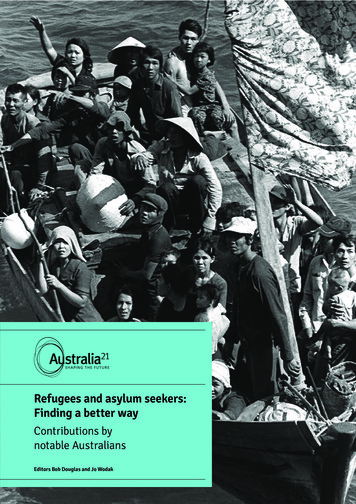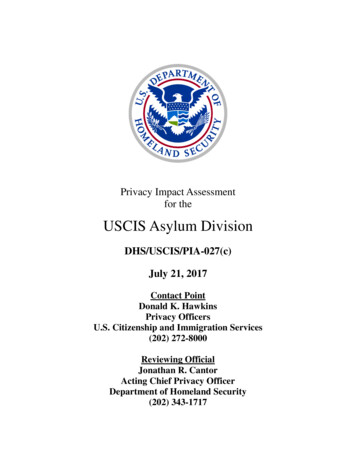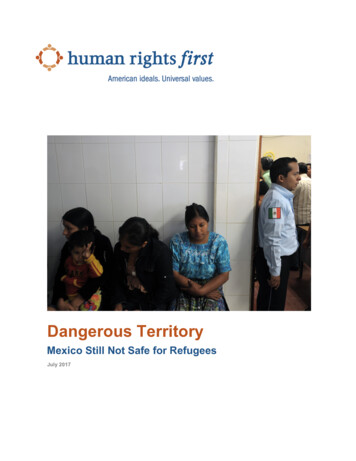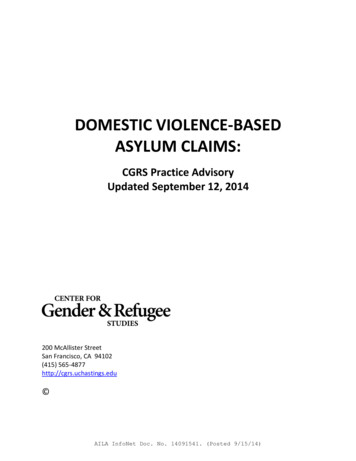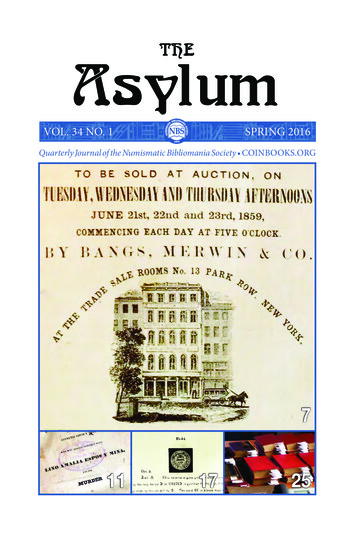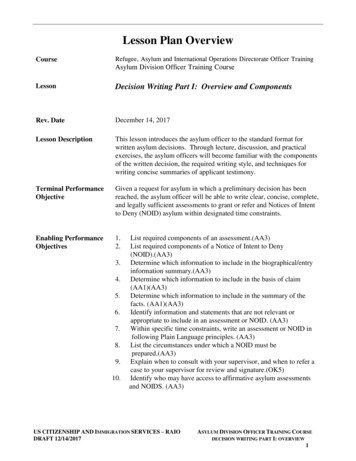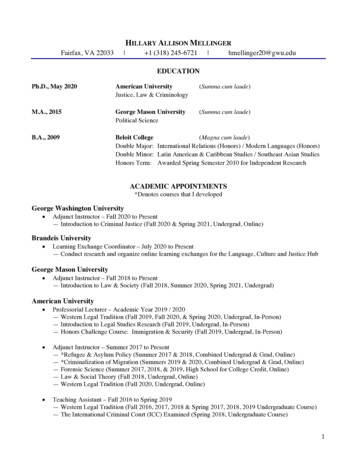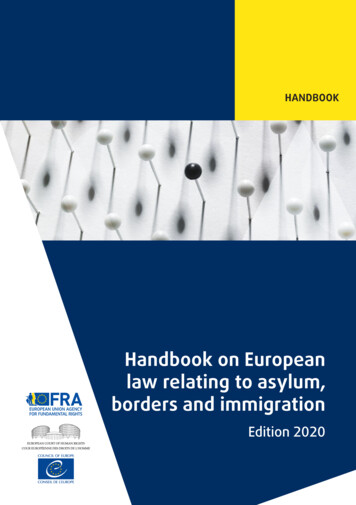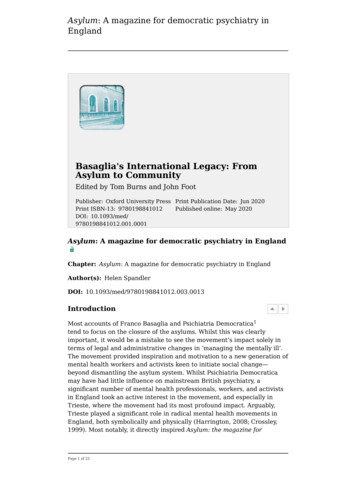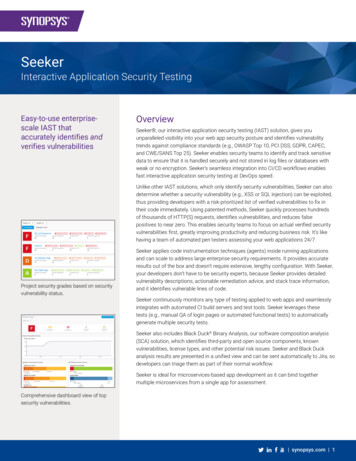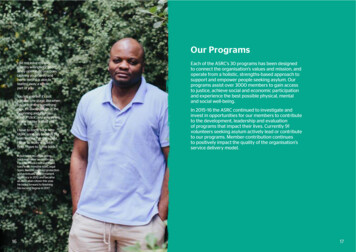
Transcription
Our Programs“I did not leave my owncountry willingly for good;in my opinion no one does.Leaving your family andhome behind is akin totearing away a wholepart of you.You tell yourself it’s justa phase, one stage, like whenyou’re learning somethingnew, it’s always tough at thebeginning and then youkind of ‘click’, and everythingopens up, like a lifted veil.I have to come back here(ASRC) one day to repay. Forme I feel like I’ve got a debt.I have to repay my debthere, I have to come back.”Each of the ASRC’s 30 programs has been designedto connect the organisation’s values and mission, andoperate from a holistic, strengths-based approach tosupport and empower people seeking asylum. Ourprograms assist over 3000 members to gain accessto justice, achieve social and economic participationand experience the best possible physical, mentaland social well-being.In 2015–16 the ASRC continued to investigate andinvest in opportunities for our members to contributeto the development, leadership and evaluationof programs that impact their lives. Currently 91volunteers seeking asylum actively lead or contributeto our programs. Member-contribution continuesto positively impact the quality of the organisation’sservice delivery model.A journalist in Congo, goingback was never an option forFreddie. Thanks to the diligent,hard work from the ASRC legalteam, Freddie received protectionand eventually his permanentresidency in 2012 and becamean Australian citizen this year.He looks forward to finishinghis nursing degree in 2017.1617
Client ServicesThe Client Services program assistspeople seeking asylum to maximisetheir own physical and mental wellbeing through holistic, integrated andresponsive services. These servicesinclude casework, counselling,continuing care, housing and accessto wider ASRC programs to ensurethey receive essential services.In the last 12 months, the volunteercasework team, made of up to 47people, provided continuity andindividual support to 352 peopleseeking asylum, assisting themthrough an uncertain and oftencomplex refugee determinationprocess. The counselling programprovided therapy and supported200 people this year, over 1472appointments by 12 volunteers.The continuing care programsupported 45 vulnerable clientsto receive intensive support.New initiatives included the creationof a critical incident policy, riskassessment tools and case plans tovastly improve the accountabilityand support provided to volunteers.All ASRC staff received trainingaround trauma informed care whichhas increased the awareness andknowledge of how to supportour members in complex situations.18General AccessProgram & Material AidOver the next year Client Serviceswill focus on identifying the viewsof people seeking asylum andincorporate them into Client Servicesprograms, working from a strengthsbased perspective that best supportsthe needs of members.The program’s Housing serviceoffers rental support to peopleseeking asylum in critical danger ofhomelessness. In 2015–16 it provided17,682 nights of shelter for peopleseeking asylum, with a total of 96people being supported, 24 ofthem children.More than 80 per cent of membershave been in danger of homelessnessdue to exclusion from work rightswhich has left them financiallydependent on important servicessuch as housing. A further 14 percent of members seek shelter afterexperiencing physical and mentalhealth hardship.Client Services will continue toadvocate for equal access to essentialservices with the aim to improvereferral pathways with sector partners,which this year included Lentara,Baptcare, Red Cross, Life WithoutBarriers, AMES and Brigidine Sisters.man was reminded“Thisof something he had notbeen able to experienceand had forgotten whatit was like to experience almost like he’d been ableto feel gratitude, love andkindness for the first timein seven years since beingseparated from his familyand home country.”ASRC ContinuingCare CoordinatorGeneral Access Program (GAP)Material AidGAP symbolises one of ASRC’s keypriorities: ensuring every personseeking asylum is provided withinformation, advice and access topsychosocial and wellbeing support.GAP is the ASRC’s first point of callfor people requiring support inrelation to a wide range of welfareissues including homelessness,family violence, social isolation anddestitution. GAP works to advocateand build relationships with externalservice providers to ensure bestpossible outcomes and access forpeople seeking asylum.A central tenet of GAP is its MaterialAid program, which provides ASRCmembers with essential items rangingfrom nappies, coats, blankets, bedding,kitchenware and cooking items, mobilephones, phone cards and Myki topups. In 2015–16, Material Aid supported1600 members as well as hundredsof non-ASRC members requiringemergency support.In a year when critical governmentfunded services continued to bereduced, GAP’s services becameever more vital. A doubling of GAP’svolunteer numbers in 2015–16 reflectedincreased demand, enabling GAP tooffer services five days per week, upfrom four days in 2014–15. In 2015–16,GAP assisted on average 45 newpeople each week and eight newmembership intakes.non-membersassistedweekly451400 people assisted to become membersIn the past year, Material Aid has helda number of drives to meet demandfor specific items. Successes includeda record 13,000 worth of gift cards;Back to School packs, thanks to apartnership with the Brotherhood ofSt Laurence; and two toy shops, tocelebrate Christmas and Eid – both inpartnership with the Salvation Army.Hundreds of members were providedwith new socks and underwear thanksto the ‘Socks and Jocks’ drive, MaterialAid’s most successful. To supportmembers through Melbourne’scold winter, Material Aid distributedhundreds of donated coats andblankets.19
HealthThe Health program delivers a rangeof primary care services togetherwith specialist clinics includingpsychiatry and pain managementfor people seeking asylum. In 2015–16,three community health nurses and87 volunteers’ assisted 629 patients(compared to 520 in 2014–15),conducted 3662 appointments. Apartnership with Daffey’s Pharmacy,enabled 350 members (compared to215 in 2014–15) access cost effectivemedications. In its first year, Health’simmunisation program delivered 1200vaccines to 173 members, including65 members receiving full catch-upimmunisations.In 2015–16, the partnership withSt Vincent’s Hospital Melbournecontinues to provide radiology andpathology services to the ASRC GPFoodbank &Community Mealsclinic. In a new partnership withBaker IDI, Health launched a freeDiabetes Risk Screening Program,to all ASRC members. The ongoingsupport of Cohealth and the Universityof Melbourne has strengthened theHealth programs ability to providebroader support to people seekingasylum.In the past year, Health launched afirst-aid training pilot program that isalready exceeding program targets;by December 2016, ASRC will have atleast 100 qualified first aid volunteersand staff.The Health program also participatesin broader advocacy as a member ofthe Victorian Refugee Health Network.Through the network, healthcareneeds of communities of peopleseeking asylum remain visible.FoodbankFoodbank is the ASRC’s foundingprogram and 15 years later, the freegrocery store meets the essentialdietary needs of 620 people seekingasylum every week, many of themchildren. That equates to 27,500member visits annually at theeconomical sum of 5 of food perperson per week.Rogers, you are“Dramazing in lookingafter our healthissue and so helpful.Thank you so much.”Member patientFoodbank received more donationsthan ever in 2015–16. A 25 per centincrease on the past year is helpingFoodbank meet its annual target of 1 million of donated food, whichprovided a further 36 of donatedfood per person each week. Inaddition to the growing generosityand compassion in the community forpeople seeking asylum, the Foodbankwas able to source more donationsthanks to a new refrigerated vandonated by The Rotary Balwyn.Over time, Foodbank has increasinglyfocused on supporting membersto make healthier food choices inaddition to providing fresh and healthyproduce. To continue this effort theFoodbank conducted cooking classesfor 45 members and trained 90volunteers in basic nutrition andfood safety skills.20This was made possible with thehelp of Second Bites FreshNed andFoodMate programs.Foodbank also developed a cookbookin collaboration with members andDeakin University nutrition students, toenable more members to use new andunfamiliar foods. This has doubled thenutritional quality of foods selected byour members in Foodbank.In addition, a new member-runWednesday night program cooksbeautiful, culturally traditional mealsfor the Legal Clinic, Innovation Huband Health programs’ staff andvolunteers. It’s a stunning exampleof how the ASRC is meeting oneof its key strategic goals of peopleseeking asylum having influence andinvolvement in the programs andservices that impact their lives.Community MealsASRC’s Community Meals programhas fast become a popular socialoutlet for members, volunteers andstaff while enjoying nutritious meals,cooked by 65 volunteers and 35member volunteers. An increase incorporate and private food donationsin 2015–16 enabled Community Mealsto serve 61,250 meals, a 25 per centincrease on the previous year.61,250delicious meals served this yearOne of the program’s proudestachievements in the past year is a70 per cent increase in the numberof member volunteers. Thanks tonew partnerships with KensingtonNeighbourhood House and MelbournePolytechnic, members have theopportunity to complete pre-hospitalityenglish training, complementingtheir valuable cooking skills.21
Employment& EntrepreneurshipEducationThere are few more important wayspeople seeking asylum can determineand advance their own future thanthrough education. ASRC’s Educationprogram incorporates English as anAdditional Language (EAL) classes,Home English tutoring (HET), IELTSpreparation classes, English forHospitality, a Book and Film DiscussionClub and Vocational Education andTraining (VET) across the ASRC’sFootscray and Dandenong offices.In 2015–16, an expanded EAL programat Footscray enabled Education tosupport growth in the frequency andlevels of EAL classes, now deliveringbeginner, intermediate and upperintermediate classes every morning ofthe week to an average 148 membersper week. In total, 80 volunteers andthree staff delivered 1596 hours ofclasses. This is in addition to the 1400hours of HET classes.At Dandenong, 250 people seekingasylum attended regular Englishclasses, with 100 members inregular conversation groups, andliteracy and pronunciation classes.Moving from an 11-week to a 22-weeksemester, increased the time availableto members to consolidate theirlanguage skills.In 2015–16, the Dandenong ASRCwas a founding member of theEnglish for Asylum Seekers app,coordinated by the English forAsylum Seekers Network.A committed team of educationadvisors and volunteers continued toprovide education casework to assist300 members enrol in a range ofGovernment-subsidised VET coursesthat lead to meaningful employmentopportunities. As well as helpingto generate work placements andtraining qualifications, participatingin VET helps build members’ selfconfidence and encourages them todevelop personal and career goals.“I’d like to start bysaying thank youto the ASRC . . .for helping me enrolin Certificate IVEducation Support.It is my short-termgoal to work as ateacher’s aide andmy long-term goalto practice myprofession asa teacher.”StudentEmploymentFor people seeking asylum, securinga job is not only vital for their financialindependence and stability, butalso essential to feeling valued andincluded in the wider Australiancommunity. In 2015–16, ASRC’sEmployment program continued toprovide a personalised employmentpreparation, support and referralservice for members, empoweringthem to become skilled, confident andindependent jobseekers.For many members already qualifiedin industries as diverse as medicalresearch, IT, geology, mining andfarming, getting that first opportunityis key. This led to a redesign ofEmployment’s Jobs Skills Trainingcomponent. Members now havethe opportunity to learn more aboutAustralia’s employment rights andconditions, minimising the risk oflabour exploitation. Out of a total 600employment referrals, 450 memberscompleted the training.Across ASRC Footscray andDandenong, 220 jobs were found formembers in 2015–16. Underpinningthe program’s success are thestrategic partnerships developedwith employers, both large and small,to source as many suitable work22opportunities for members as possible.In 2015–16, these successes includedan internship and work experienceprogram with McCann, and standingreferral relationships at Aesop, Sussan,and Maurice Blackburn Lawyers. Thereferral relationships have been sosuccessful that many employers returnto the ASRC for repeat business: Seasolnow employs 16 ASRC members, andRylock, four. We are currently workingwith a major bank to place membersin paid internships across a rangeof areas, from customer service toproject-based roles.Gaining initial Australian workexperience has also been keyto members accessing furtheropportunities. At IDP Education,three members started in contractroles, with one appointed to anongoing role and another, Khriso,moving to a full-time position in I.T.at Monash University.EntrepreneurshipThe ASRC’s Entrepreneurshipprogram is one of its most excitingand rewarding, empoweringmembers to invest their skills andtalents in starting their own business.In 2015–16, the program’s ‘incubator’was instrumental in supporting thelaunch of six member-led businesses –a 50 per cent increase on theprevious year.Eight volunteers and one staffmember assisted 53 memberswith individual business coaching,facilitated a vital network for memberswith Melbourne’s business community,and invited industry experts to deliverworkshops tailored specifically tomembers’ needs.all my success,“Withthe ASRC played animportant role togive me confidenceand a platformfor my dreams tocome true, with veryprofessional andkind staff members.”Khisro,IT Specialist andformer member23
WISE Women& MentoringSocial and CommunityDevelopment & DrivingASRC Music GroupWISE WomenAt the ASRC’s Innovation Hub, womenmembers are referred to the WISEWomen program, assisting them torealise their career potential, whetherit be securing employment, education,or starting their own business. WISEWomen’s impact is significant, withwomen members now comprising40 per cent of the Innovation Hub’sprogram participation rate. Thatequates to 229 women membersjoining the Hub since July 2015. Onthe professional development front,135 women were enrolled in variousprofessional courses, including beautyand hairdressing. Many womenmembers are already accomplishedprofessionals and an Australianqualification is an essential step toresuming their careers.Like many ASRC programs, WISEWomen is driven by members. Inthe past year, 35 women membersstarted volunteering at the Hub, with12 members creating a Women’sAdvisory Committee. Meetingquarterly, the Committee reviewsand plans for the program’s ongoingdevelopment. This complementsdevelopment of a new Women inBusiness program, to be launched inthe coming year.24The focus next year will be a ‘womenin business’ training program tailoredfor women are not only focused onthe practical, such as budgeting andcomputer skills, but also at buildingmembers’ confidence, such asassertiveness training.MentoringThe ASRC’s mentoring programassists people seeking asylum torealise their professional and personalgoals, connecting them with mentorsfrom a broad range of industry andcommunity sectors. In 2015–16, asignificant restructure of the programdelivered immediate results: a 20 percent increase in participants on theprevious year, supported by one staffmember, and 20 volunteers, includingone member volunteer.The program has broadened toencompass three streams: professional(supporting members’ withemployment pathways); vocationaland career guidance; and socialmentoring. Each stream is provingcritical support to members’ on theirown pathway to independence. Andthe results speak for themselves: in2015–16, 23 members obtained workin their chosen professions in fieldsas diverse as geology, engineering,finance and community development.A further three members obtainedindustry internships. Eight enrolled intertiary study, three were employedas tutors at Victoria University, andsix employed as researchers at theUniversity of Melbourne.Crucially, members are at theforefront of the program’s ongoingdevelopment, with member thinktanks and a research study projectcontinuing to inform the program’sfuture direction.Social and Community DevelopmentSocial participation and connectionis vital to a person’s physical andmental wellbeing. For more than500 ASRC members, the Social andCommunity Development programsupports their independence andengagement with each other and thebroader community. In 2015–16, theprogram was consolidated into threemain branches: Social Outings andCultural Activities; Sports and Arts;and Health Promotion.ASRC members have been thedriving force behind the formation ofASRC’s soccer team made up of 25members. It is proving a talented andcompetitive team, reaching second inthe VicSoccer League. The soccer hubwas also established in partnershipwith Brimbank Council and New HopeFoundation. Other activity programsinclude cricket, gym membershipsand cycling.229newwomen HubmembersOn Wednesday nights 15 membersshare music from their home country,rehearsing for performances, 15 ofwhich were held in 2015–16. Theprogram’s art activities include atheatre group, which performedtwo works in 2015–16 developed incollaboration with 30 people seekingasylum.An arts space also provides a safe,supportive outlet for members toexpress themselves through art.DrivingIn 2015–16 the ASRC launched anew program in partnership withTransurban, to provide drivinglessons to people seeking asylum,who do not have Australian drivingexperience or work rights to payfor driving lessons. The program’sbenefits are immeasurable – a driver’slicence is vital to one’s independence,supporting people seeking asylum todetermine their own future.Over 11 months, the programrecruited 12 volunteer coaches andseven program support volunteersto deliver 362 coaching lessons.Professional instructors also provided73 licence preparation lessons and72 assessments. Fifteen participantsobtained their driver’s licence,and received their certificates at acelebration for all program participantsand volunteers. Sadly, the celebrationalso marked the program’s end. Plansare currently underway to continue avolunteer-run program until additionalfunding can be secured.like“Inowasonefeelingwants me.Now that I can driveand I have a job,I’ve become a realperson. When you’reworking, your mindbecomes free.”Member driving student25
Empowerment Pathways& Youth Empowerment"If you give something to thecommunity, the communitygives back. My favouritething about volunteeringis helping people, andrepresenting that I am anasylum seeker to otherpeople. That we're not hereto sit, sleep and eat, we wantto do something significantfor the community and forthe people”.When Mohammad* wasn’t at hispaid job working at the UN, he wouldvolunteer as a nurse treating peopleaffected by bomb mines, makingroom for new refugee settlements inPakistan and Iran.Here in Australia, Mohammad helpspeople seeking asylum and refugeesin the community, from helping out inthe ASRC Foodbank, talking to dialysispatients, reception and aged careservices. He racks up hours across sixdays a week that exceed most normalfull-time jobs.*Alias of the person whobravely shared their storyEmpowerment PathwaysYouth EmpowermentEmpowerment Pathways consolidatesthree programs; Youth Empowerment,WISE Women, and the intake of meninto the Innovation Hub, the ASRC’sspace and stream which houses ouremployment, education, social andcommunity develop, entrepreneursprograms.The Youth Empowerment programsupports young people seekingasylum under 30 to increase theirparticipation and engagement withthe broader community throughwork, study, friendship and recreation.The result has been a close, engagedgroup of young people who arebuilding the confidence, connectionsand skills to thrive in Australia.This program manages themembership of men over the age of25, all of whom meet with an intakeworker to design a pathway that isgoal-oriented, and aimed at providingaccess education and training relevantto the person’s needs and aspirations.A great achievement of EmpowermentPathways has been the huge increasein member volunteers workingwithin the Hub. The Hub receptionis currently fully member-staffed,and more than half of all volunteersworking within the Hub are membersof the ASRC.26In an eight week Step to Workprogram, members designed aprogram to help build their confidencein which they learnt about resumewriting, leadership, public speaking,employee rights, pay rates andtaxes and workplace culture. Partof this program involved valuablework experience at the ASRC.Some members also took up workexperience opportunities with Scarf,ANZ Bank, Richmond Café and Telstra.In the year ahead, the program willextend to the Dandenong office andbe run by youth in the area.We do not need“yourpity and saving.We just want peopleto listen to us andacknowledge ourknowledge, skillsand experiences.”Member27
Community Engagement& Community EducationHuman RightsLaw ProgramThe Human Rights Law program is acommunity legal practice that worksto ensure people seeking asylumhave access to justice at all stages ofthe refugee determination process.Consisting of ten lawyers and 210volunteers, the program operatesfour legal clinics weekly, offers dailylegal triage services, telephone advicetwice a week, detention outreach andongoing representation for peopleseeking asylum. The program alsoconducts community legal educationand training, and engages in advocacyand law reform.In 2015–2016, the HRLP processed2672 requests for legal assistance andopened around 1000 client files.The critical issue facing the legalteam in the past 12 months was thegovernment’s decision to commenceprocessing the 24,500 asylumseekers who have been residing inAustralia for several years. Peoplewho arrived by boat between August2012 and December 2013 are subjectto a new system of processing called28‘Fast Track,’ and are only eligible fortemporary protection visas. Thisnew system provides for reducedtimeframes, restricted opportunities tointroduce new information and limitedoptions to appeal a negative decision.With 11,000 people in Victoriasubject to the Fast Track system, thelegal team have responded to theextraordinary demand on our servicesthrough establishing innovativemodels for targeted legal assistance.The program also assisted 700 ‘FastTrack’ clients, and conducted externallegal information sessions to 376people seeking asylum.In 2015–16, a program established apro-bono network including a newlegal clinic with private law firmsMaurice Blackburn and RussellKennedy. The firms’ lawyers andparalegals staff these clinics and workdirectly with people seeking asylumto complete complicated formsand statements required to seek aprotection visa.I came to“Whenthem they were sopromising towardsme and they wereso supportive. Andthey were there forme, like hope fora bright future.”Member2672legal appointments provided04legal clinicsrun eachweekCommunity EngagementEstablished in October 2015, theCommunity Engagement programincorporates the CommunityEducation, Speakers, Youth andSchools programs. Partnering withthe broader community, CommunityEngagement aims to educate andmobilize people to take action on theissues facing people seeking asylum.Comprising four staff, 20 volunteersand two member volunteers, inthe past year the CommunityEngagement program hasfacilitated workshops and speakingengagements for a range oforganisations, with a focus onchanging the conversation aboutpeople seeking asylum. Supportedby messaging research, the programengaged with ASRC staff andvolunteers, providing valuable insightsto enhance their advocacy work.A member-driven network has alsobeen established, providing a safeenvironment for people seekingasylum to participate in collectiveadvocacy. An additional focus in2015–16 was the empowerment andmobilisation of targeted audiences,particularly young people. Theformation of a youth programcomplements a recent realignmentof the ASRC’s community educationand schools programs.Community EducationThe Words that Work researchproject, led by Anat Shenker-Osorio in2015, was the catalyst for the ASRC’sCommunity Education program,launched in February 2016. Theprogram’s aims are to raise communityawareness and understanding of theresearch project, which analysed themessages and language that can beused to advocate more effectively forthe rights of people seeking asylum.3500The program has generatedtremendous interest, with more than500 people, including ASRC staff andvolunteers, attending a number ofmessaging workshops.600in community action groupin anti-deportation action group29
Detention RightsAdvocacy & SpeakersDetention Rights AdvocacyNow in its third year, the DetentionRights Advocacy program providesan essential service, visiting peopleseeking asylum in detention towitness, record and report onconditions and human rights abuses,as well as to link people with legal andmedical assistance. The Advocacyprogram works closely with the ASRCLegal program to ensure people getrepresentation and to improve theconditions they are forced to endure,often for years.Over the past year, Australian BorderForce has implemented stricterconditions on the nature of these visits,deeply affecting people in detention,and making the program’s work moreimportant than ever.The program works with othercommunity groups supporting peoplein detention both on and offshore.The recent publication of ProtectionDenied, Abuse Condoned: Abuseof Women on Nauru, co-writtenby five women, has been critical inuncovering evidence of physical,sexual and mental abuse of womenon Nauru.30SpeakersThe ASRC’s Community Speakersprogram raises community awarenessabout the facts related to peopleseeking asylum. The community’sthirst for information is reflected inthe ongoing demand for the program’sservices. In 2015–16, seven volunteerspeakers addressed 92 differentcommunity groups and organisations,attended by 5654 people.Supported by one staff member andthree volunteers, speakers participatedin a redevelopment of the program’straining and presentation plans,aligning with Community Education’smessaging project.Campaignswonderful“Ittowashave the speakerat our functionand we were gladshe gave us suchan interestingpresentation . . .she was an importantpart of our day.”Speaker event feedbackWe campaign and advocate for peopleseeking asylum in our community andin detention, raising issues throughthe media, activating supportersonline, and creating opportunitiesfor the public to advocate for a morewelcoming and inclusive community.Kids OutIn 2015 the ASRC campaigned forthe release of 112 children in onshoredetention before Christmas. Throughengaging media, as well as onlinevideos, social media, and campaignemails, we activated people to writeto or call Prime Minister MalcolmTurnbull’s office. Our supporterswrote hundreds of letters and madehundreds of calls. And thousandsof social media interactions helpeddrive support to release children fromdetention before Christmas.Kids Out Day of SolidarityOn International Children’s Day 2015,the ASRC led the Kids Out Day ofSolidarity delegation to the offices ofthe Prime Minister and ImmigrationMinister. We produced polling whichshowed that the majority of votersin Malcolm Turnbull’s Wentworthelectorate wanted women andchildren released from detention.In collaboration with GrandmothersAgainst the Detention of Children andMums4Refugees, we led a delegationto the Prime Minister’s office. InBrisbane, alongside Mums4Refugeeswe visited the office of ImmigrationMinister, Peter Dutton, calling forchildren to be released from detention.Let Them StayIn early 2016, the ASRC partnered withnational campaigning bodies to rallysupport to stop the deportation of 267people seeking asylum to the Naurudetention centre. Tens of thousands ofpeople across the country joined thecampaign using social media, onlineactivism and direct action to stop thedeportations and call for people toremain in our community.More than 14,500 supporters signedour petition calling on the Governmentto allow the people to stay in Australia.We mobilised supporters through ourwhite balloon action at Flinders StreetStation, and formed a human chainin the Melbourne CBD to show ‘this iswhat 267 people look like’. Volunteersand supporters also conducted leafletdrops across Melbourne train stations.Right TrackFollowing the Words that Workmessaging research, the ASRC beganthe Right Track campaign which aimsto build a broad advocacy network toempower communities throughoutthe country to change attitudestowards people seeking asylumThe campaign calls for a refugeedetermination process that: restores funding for legalassistance for people applyingfor protection visas creates a fair and efficient processfor everyone who seeks asylum inour community, no matter howthey arrived ensures permanent, not temporary,protection for everyone assesses people’s cases for asylumin a safe space while they rebuildtheir lives in our community, notin detention.The Right Track campaign aimsto foster a grassroots movementdesigned to transform the politicalenvironment around this issue andcreate a welcoming community thatsupports people seeking asylum.31
Youth ActionProject & SchoolsYouth Action ProjectSchoolsLaunched in October 2015, the YouthAction Project provides a forum foryoung people to meet and learnfrom people with lived experien
programs assist over 3000 members to gain access to justice, achieve social and economic participation and experience the best possible physical, mental and social well-being. In 2015!16 the ASRC continued to investigate and invest in opportunities for our members to contribute to the development, leadership and evaluation
